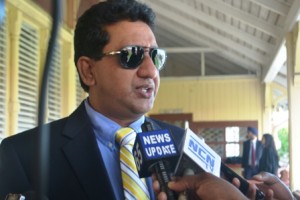– Nandlall blames jury system, witnesses

There has not been a single conviction for sexual offences in Guyana since 2011 – a situation which Attorney General (AG) Anil Nandlall described as alarming and blamed the archaic jury system as well as reluctant witnesses for the problem.
For the years 2012 and 2013, some 22 sexual offences cases were taken before the courts, but there has been no conviction. Instead, there have been a number of hung juries, witnesses failing to attend court and some victims deciding not to pursue the matter.
Review of jury system
It is against this background that the AG in his budget debate presentation announced that a complete examination of the jury system will be undertaken this year, noting that this component of the criminal justice system has virtually remained untouched since its introduction to the legal system some 100 years ago.
“By the sheer passage of time, it requires some examination with a view of effecting modern changes to it, which have already been long done in almost every Commonwealth jurisdiction that retains the institution of the jury.”
The Attorney General said that the administration of criminal justice is a two-way street, noting that the State and by extension, the victims of crimes and their relatives are equally entitled to a fair trial as is the accused person. “That delicate balance must always remain intact. The jury system is an integral factor in this equation,” he said.
Nandlall told the House that the Director of Public Prosecutions (DPP) and the Constitutional Commission on Women and Gender Equality have met with him and many important civil society organisations.
Given the statistics on the issue, Nandlall said in 2011, 16 sexual offences cases were completed.
There were three guilty pleas; three cases were nolle prosequi because the Virtual Complainant (VC) gave a statement expressing a desire not to proceed with prosecution. There were seven not-guilty verdicts by the jury.
However, in 2012, 10 sexual offences cases were completed. In two cases, there was a formal verdict of not guilty because the VC did not -attend court to testify, eight cases went to trial and in all eight cases the jury returned a not- guilty verdict. For 2013, 12 sexual offences cases were completed, eight of which the VC went to court and indicated that they were not willing to proceed with the trials. Those cases had to be discontinued by the DPP.
Additionally, in one case, the VC could not be located, while three cases went to trial. In one of the three cases, there was a unanimous not guilty verdict and the remaining two cases there were hung juries.
“Therefore in 2012 and 2013 there was not a single conviction for sexual offences in a total of 22 cases,” Nandlall lamented.
The Attorney General said in an examination of the jury system, care will be exercised to ensure that there is no erosion of its principal objective, which is affording the accused a trial by his peers.
“The changes will include a review of the current jury pool with the objective of expanding it.” Nandlall said currently, the pool is quite limited and it has been historically confined to just a few entities from which jurors are drawn.
Additionally, he said the qualifications of jurors will also be reviewed, noting that currently, they are linked to ownership of property, or earning capacity.
Both of these qualifications Nandlall said in today’s society are archaic and irrelevant. In the process, the unanimity verdict in relation to capital offences and majority verdict in relation to non-capital offences of the jury which currently obtains will also be reviewed.



